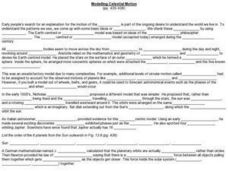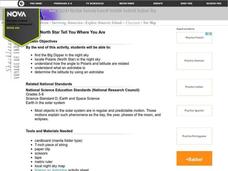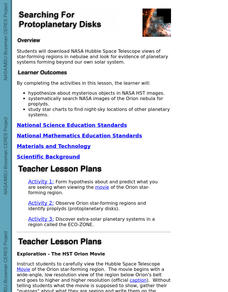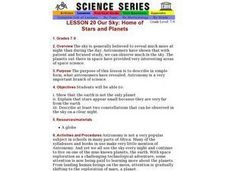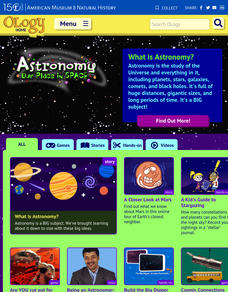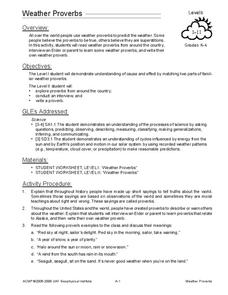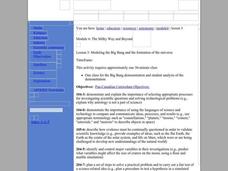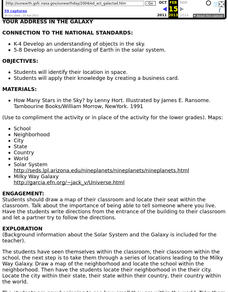International Technology Education Association
Tidy Up Those Sloppy Force Fields!
It is just magnetic. This resource presents the concept of Earth's and another planet's magnetic field and how spacecrafts detect them. Learners study a problem using magnetometers and participate in three experiments to come up with a...
Curated OER
Modeling Celestial Motion
In this modeling celestial motion worksheet, students fill in the blank about the motion of celestial bodies: planets and stars. Students complete the blanks with information about the scientists and philosophers responsible for early...
Curated OER
Let the North Star Tell You Where You Are
Students create an astrolabe and locate the North Star in the night sky. They determine the latitude of the North Star, and calculate an average latitude based on class results.
Curated OER
Let the North Star Tell You Where You Are
Students participate in activities in which they find the Big Dipper and locate the North Star in the night sky, examine the relationship between the angle to Polaris and latitude, and determine latitude by using an astrolabe.
Curated OER
Knowledge Quiz: The Universe
In this universe quiz worksheet, students complete a set of 10 multiple choice questions that cover a variety of concepts about the universe: constellations, black holes, the solar system, etc.
Curated OER
Searching For Protoplanetary Disks
Students download NASA Hubble Space Telescope views of star-forming regions in nebulae and look for evidence of planetary systems forming beyond our own solar system. They hypothesize about mysterious objects in NASA HST images.
Curated OER
Is There a Tenth Planet?
In this planets worksheet, students read about how our solar system's planets were discovered and how scientist believe there might be a tenth planet. After reading, students complete 4 short answer questions.
Curated OER
Plotting Sunspot Activity
Students explore how to graph sunspots using a solar graph. In this sunspots lesson students investigate sunspots and complete and evaluation worksheet.
American Museum of Natural History
A Closer Look at Mars
A website looks at how we know so much about Mars—telescopes, robots, and spacecraft—and the search for martian life. Following the informational text are three questions that quiz pupils about possible life on Mars.
Curated OER
Our Sky: Home of Stars and Planets
Students discover that astronomy is a branch of science that includes the study of planets, stars, and constellations.
Curated OER
What's Up?
Students compare and contrast the various heavenly bodies found in the sky at night. They identify the moon and stars in the sky as well as how the stars form pictures called constellations. Students also experiment with reflection and...
Curated OER
What's Up? Astronomy Curriculum
Students study astronomy. In preparation for a field trip to a planetarium, students discuss the stars, planets, and light. They explore the importance of the north star and constellations. The Digitarium system is used to assist the...
Intel
Starquest
Almost every ancient culture observed the stars and saw pictures in the patterns. Studying stars allowed them to guide travelers, determine when to plant crops, when to harvest food, and the stories surrounding the images include some of...
American Museum of Natural History
Planetary Mysteries
A website all about planetary mysteries—it's a one-stop-shop for all things, stars, planets, and space travel. Scholars read an astronomy overview to discover the page's big ideas, then choose from the plethora of resources, including...
Curated OER
Comet Myths, Facts, and Legends
Here is an interactive book lesson through which learners explore the facts and stories about comets. The plan is comprehensive, providing background information, standards met, vocabulary, assessment ideas, and more. Though the content...
Space Awareness
Star in a Box
What happens to stars as they get older? A simulation takes pupils through the life cycle of stars based on their masses. The resource introduces the Hertzsprung-Russell diagram and the common relationships and life cycle patterns observed.
Curated OER
Weather Proverbs
Your class explores weather proverbs and superstitions from around the country and writes their own proverb about weather. They interview community elders to learn proverbs about Alaska and its weather. Then they discuss several example...
Curated OER
Lunar Lollipops
Students simulate the phases of the moon using a lamp and styrofoam balls. In this lunar phases lesson, students stand around a lamp and act as Earth. They hold styrofoam balls and rotate to show the phases of the moon.
Curated OER
The Big Bang Theory
Students will use scientific reasoning to formulate ideas about the formation of the universe using the Big Bang Theory. The use of critical thinking skills is part of the activity and the foundation of the scientific method will serve...
Curated OER
Modeling the Big Bang and the Formation of the Universe
Sixth graders conduct an experiment to understand the Big Bang Theory. In this Big Bang Theory lesson, 6th graders will observe a balloon with confetti popping to emulate and analyze information related tot he Big Bang theory....
Curated OER
Your Address in the Galaxy
Students create a business card after researching their location in space and determining their Galactic Address.
Curated OER
Graphing Sunspot Cycles
Students explore sunspots and then graph them to analyze the data. In this sunspot cycles lesson students complete an activity sheet and complete questions.
Curated OER
Heavens Above
Middle schoolers study the stars and their positions. In this astronomy lesson students see how scientists can predict the positions of the stars and can tell how they would have appeared in the past.
Curated OER
Tracking an Active Sunspot Region
Eighth graders plot the location of a single active region for 12 days. In this sunspot lesson students track an active region across the face of the sun.



